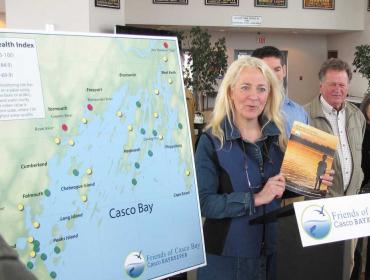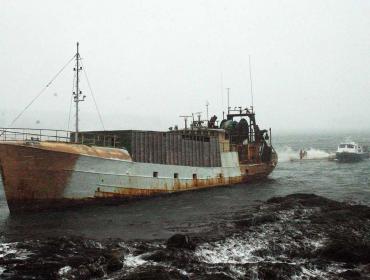Posted March 25, 2020
Last modified March 25, 2020
By Rob Snyder
My recent conversations with local leaders reinforce the urgency with which I believe towns must act to secure the health, economic viability, and social fabric of their communities. One of the highest priorities is to ensure that children’s needs are met. In addition, there is a range of scenarios that towns are planning for beyond the next 90 days that consider the significant impacts to their community economies.
All of us at the Island Institute are grateful for the frontline responders in our communities, and we appreciate their phone calls and valuable time spent helping to shape our response.
My children attend school in Rockland, where upwards of 85 percent of the school children rely on free and reduced lunch programs. These programs operate at similar levels in many communities along our coast. They are supplemented heavily by local food banks that provide meals to families in the evenings and on weekends and generally fill gaps left by federal programs.
The urgent need to address hunger in new ways, and the increased need for related social services, are growing as the economy stalls. Please do all you can to support the local organizations working to meet these crucial needs. We’ve compiled a list of organizations that you may consider supporting.
In addition to addressing basic human needs like food and shelter, students need to access their homework remotely via the internet. On March 16, Maine students began studying from home, having been provided with iPads loaded with a week’s worth of exercises. By March 23, most students needed to check in with their teacher online to get their next assignments.
However, the Department of Education estimates that upwards of 20 percent of Maine households do not have access to broadband (high-speed internet). This means thousands of Maine students have no internet access at home, and thousands more have inadequate internet to engage in many of the online educational resources being offered to students now. The children in these homes will fall behind in their studies if this need is not met.
Wi-Fi Hotspots are an affordable short-term answer to this problem. The National Digital Equity Center and the Maine Department of Education are working together with regional organizations like the Island Institute to ensure hotspots are available across the state.
On March 6, the Island Institute began reprioritizing work as the impacts of the pandemic grew locally. The Island Institute’s 90-day response to the COVID-19 pandemic is focused on minimizing potentially catastrophic community and economic disruptions to Maine’s island and coastal communities.
Our work includes a mix of long-term solutions and immediate support, all oriented toward assisting leaders in confronting change:
Pass Maine’s $15 Million Broadband Bond Question in June
The crucial need to expand the state’s broadband infrastructure is especially evident now. The Island Institute has focused on this issue for the past seven years. During this time, we’ve developed models for how to deploy bond funds locally. As the pandemic worsened and emergency legislation was developed, we worked as one of the leaders of the Maine Broadband Coalition to help place a question before Maine voters this June. In the next 90 days we will be doing all we can to ensure that Mainers understand and support this important investment.
Catalyze Resilient Leadership
We are connecting community leaders with the best information, the most useful networks, and the highest quality technical support they need as the pandemic evolves. Through our community data, weekly online forums, and targeted workshops, we are focused on helping leaders overcome the challenges of isolation while confronting disruptions. We began by working in Augusta supporting legislation so that communities could function via online platforms during the crisis. The town of Vinalhaven hosted a meeting which over 1,000 people attended via Facebook Live (up from an average of seven at normal meetings). We’ve begun hosting online forums, first for island municipal leaders and then transportation companies. We plan to expand these conversations across sectors along the coast so everyone is learning from one another while taking action.
Support Small Businesses
On average, 20 percent of working age people along the coast are self-employed. Down the peninsulas and out on the islands we have upwards of 60 percent to 70 percent self-employment. Our two-pronged effort to support small businesses includes influencing policy making in Washington, D.C. and Augusta so that federal resources that flow to Maine meet the needs of the small businesses that define our coastal economy. Concurrently, we will be hosting online forums to teach small businesses how to leverage technology to stay in touch with customers.
If you are leading in your community through this crisis, thank you. Thank you for your efforts to keep your communities healthy and functioning during the pandemic. If you are among those who live outside of Maine but care about our coast, consider lending your support to the organizations highlighted here, and please support our work at the Island Institute.
Rob Snyder is president of the Island Institute.

Contributed by




